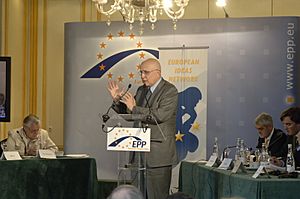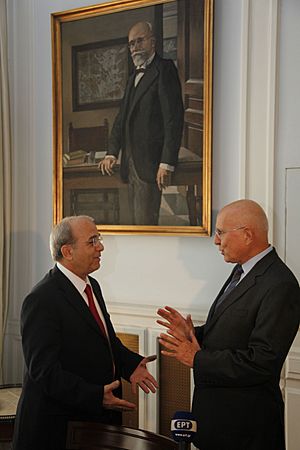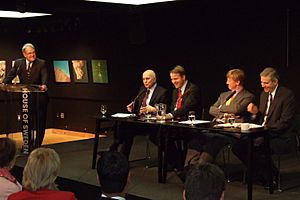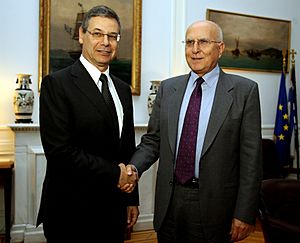Stavros Dimas facts for kids
Quick facts for kids
Stavros Dimas
|
|
|---|---|
|
Σταύρος Δήμας
|
|
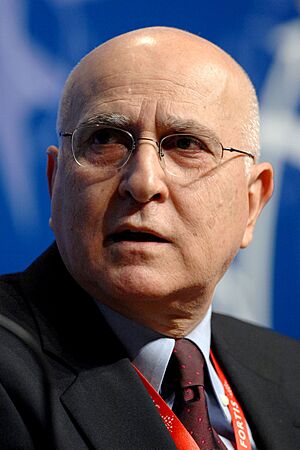
Dimas in 2008
|
|
| Minister for Foreign Affairs | |
| In office 11 November 2011 – 17 May 2012 |
|
| Prime Minister | Lucas Papademos |
| Preceded by | Stavros Lambrinidis |
| Succeeded by | Petros Molyviatis |
| Deputy Leader of New Democracy | |
| In office 2 July 2010 – 24 November 2015 |
|
| Leader | Antonis Samaras Vangelis Meimarakis |
| Preceded by | Position established |
| European Commissioner for the Environment | |
| In office 22 November 2004 – 9 February 2010 |
|
| President | José Manuel Barroso |
| Preceded by | Margot Wallström |
| Succeeded by | Janez Potočnik |
| European Commissioner for Employment and Social Affairs | |
| In office 18 February 2004 – 22 November 2004 |
|
| President | Romano Prodi |
| Preceded by | Anna Diamantopoulou |
| Succeeded by | Vladimír Špidla (Employment, Social Affairs and Equal Opportunities) |
| Personal details | |
| Born | 30 April 1941 Klenia, Greece |
| Political party | New Democracy |
| Children | 3, including Christos |
| Alma mater | University of Athens New York University |
Stavros Dimas (born on April 30, 1941) is a Greek politician. He is well-known for his role as the European Commissioner for the Environment from 2004 to 2009. He also served as the Minister for Foreign Affairs in the Greek government from November 2011 to May 2012. In 2014, he was put forward as a candidate for the President of Greece, but he did not get enough votes.
Contents
Early Life and Education
Stavros Dimas was born in 1941 in a village called Klenia in Corinthia, Greece. He studied law at the University of Athens. After that, he continued his studies and earned a Master of Laws degree from New York University in the United States.
Career Beginnings
In 1968, Stavros Dimas started his career as a lawyer. He worked for a law firm on Wall Street in New York City. The next year, he joined the World Bank. There, he focused on helping with investments in countries in Africa and the Middle East.
In 1975, he returned to Greece. He became the deputy governor of the Hellenic Industrial Development Bank. At the same time, he was part of a group preparing Greece to join the European Economic Community (EEC).
Entering Politics in Greece
Stavros Dimas became active in Greek politics in 1977. He joined the New Democracy party, which is a conservative political party. He was elected as a Member of Parliament (MP) and served in the Greek parliament for ten terms in a row.
During his political career in Greece, he held several important government jobs:
- He was a Deputy Minister of Economic Coordination.
- He served as the Minister of Trade.
- He was also the Minister of Agriculture twice.
- He held the position of Minister of Industry, Energy, and Technology.
- From 1995 to 2000, he was the Secretary-General of the New Democracy party.
European Commission Role
Stavros Dimas also worked for the European Commission, which is like the government of the European Union.
Commissioner for Employment
In March 2004, he was appointed as the European Commissioner for Employment and Social Affairs. This role involved looking after jobs and social issues across Europe. One of his main tasks was to make rules about working hours stricter.
Commissioner for the Environment
Later, in November 2004, Stavros Dimas became the European Commissioner for the Environment. This was a very important job. He announced four main goals for his time in this role:
- Dealing with climate change.
- Protecting biodiversity (the variety of life on Earth).
- Looking after public health.
- Promoting sustainability (using resources wisely for the future).
He strongly supported the Kyoto Protocol, which is an international agreement to reduce greenhouse gas emissions. He also worked on projects like Natura 2000 to protect natural areas.
Views on Environmental Policy
When he was first appointed, some people worried that he might not be strong enough on environmental issues. This was because he had a background in law and industry. However, he quickly showed that he believed protecting the environment and helping the economy grow could work together. He said that environmental policies could even encourage new technologies.
Over time, many environmental groups supported his work. They felt he successfully pushed for environmental protection within the European Commission.
Tackling Climate Change
Stavros Dimas played a key role in the EU's efforts against climate change. In December 2004, at UN talks in Buenos Aires, he tried to get countries to agree on new rules for reducing pollution after 2012. He believed that fighting climate change was like a "world war" that would last for many years.
He helped introduce the EU's emissions trading scheme in 2005. This system allows companies to buy and sell permits to pollute, encouraging them to reduce their emissions. He also wanted to include airlines in this system.
In 2007, he proposed plans to make cars more fuel-efficient. He aimed to reduce car emissions to no more than 130 grams of CO2 per kilometer. This was a big step towards cleaner cars.
Return to Greek Politics
In July 2010, Stavros Dimas was appointed as the vice-president of the New Democracy party. He was in charge of economic and social affairs.
From November 2011 to May 2012, he served as the Minister for Foreign Affairs for Greece. This was during a time when Greece had a special interim government.
In December 2014, he was nominated to become the President of Greece. However, he did not receive enough votes from the parliament. This led to the parliament being dissolved and new elections being called.
See also
 In Spanish: Stavros Dimas para niños
In Spanish: Stavros Dimas para niños
 | John T. Biggers |
 | Thomas Blackshear |
 | Mark Bradford |
 | Beverly Buchanan |


